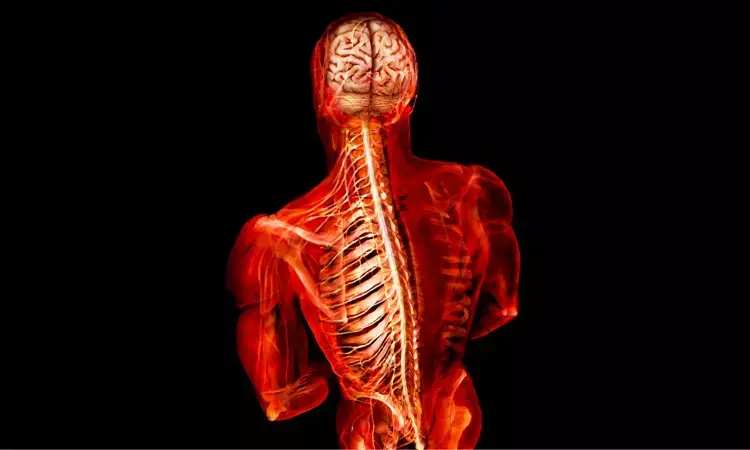- Home
- Medical news & Guidelines
- Anesthesiology
- Cardiology and CTVS
- Critical Care
- Dentistry
- Dermatology
- Diabetes and Endocrinology
- ENT
- Gastroenterology
- Medicine
- Nephrology
- Neurology
- Obstretics-Gynaecology
- Oncology
- Ophthalmology
- Orthopaedics
- Pediatrics-Neonatology
- Psychiatry
- Pulmonology
- Radiology
- Surgery
- Urology
- Laboratory Medicine
- Diet
- Nursing
- Paramedical
- Physiotherapy
- Health news
- Fact Check
- Bone Health Fact Check
- Brain Health Fact Check
- Cancer Related Fact Check
- Child Care Fact Check
- Dental and oral health fact check
- Diabetes and metabolic health fact check
- Diet and Nutrition Fact Check
- Eye and ENT Care Fact Check
- Fitness fact check
- Gut health fact check
- Heart health fact check
- Kidney health fact check
- Medical education fact check
- Men's health fact check
- Respiratory fact check
- Skin and hair care fact check
- Vaccine and Immunization fact check
- Women's health fact check
- AYUSH
- State News
- Andaman and Nicobar Islands
- Andhra Pradesh
- Arunachal Pradesh
- Assam
- Bihar
- Chandigarh
- Chattisgarh
- Dadra and Nagar Haveli
- Daman and Diu
- Delhi
- Goa
- Gujarat
- Haryana
- Himachal Pradesh
- Jammu & Kashmir
- Jharkhand
- Karnataka
- Kerala
- Ladakh
- Lakshadweep
- Madhya Pradesh
- Maharashtra
- Manipur
- Meghalaya
- Mizoram
- Nagaland
- Odisha
- Puducherry
- Punjab
- Rajasthan
- Sikkim
- Tamil Nadu
- Telangana
- Tripura
- Uttar Pradesh
- Uttrakhand
- West Bengal
- Medical Education
- Industry
Use of common antibiotic erythromycin potential cure for myotonic dystrophy

Japan: A phase 2 trial has provided promising evidence of the safety, tolerability, and potential efficacy of erythromycin in treating patients with myotonic dystrophy type 1 (DM1). The study findings, published online in Lancet's eClinicalMedicine, showed that erythromycin was well-tolerated, with no serious safety concerns observed.
The researchers indicate the need for a well-powered phase 3 trial to evaluate efficacy, building on the preliminary findings from this study.
The trial introduces splicing biomarkers as a novel way to evaluate treatment effects and paves the way for further clinical trials and research in the pursuit of effective therapies for DM1, which currently lacks fundamental treatment options.
"If successful, erythromycin may present a novel therapeutic option for patients with myotonic dystrophy type 1, offering hope for improving their quality of life and addressing the unmet medical need in this devastating disease," the researchers wrote.
Myotonic dystrophy type 1 is a devastating multisystemic disorder caused by a repeat expansion of CTG in the DMPK gene, which subsequently triggers toxic RNA expression and dysregulated splicing. A preclinical study demonstrated that erythromycin reduces the toxicity of abnormal RNA and ameliorates the aberrant splicing and motor phenotype in DM1 model mice.
Against the above background, Masayuki Nakamori, Osaka University Graduate School of Medicine, Osaka, Japan, and colleagues conducted a randomized, multicenter, placebo-controlled, double-blind, phase 2 trial to translate preclinical findings into practical applications in patients with DM1 by evaluating the efficacy and safety of erythromycin.
For the trial, 30 adult patients with DMI enrolled. They were randomly assigned in the ratio of 1:2:2 ratio to receive either a placebo or erythromycin at two daily doses (500 mg or 800 mg) for 24 weeks.
The study's primary outcome was the tolerability and safety of erythromycin. The secondary efficacy measures included splicing biomarkers, 6-minute walk test results, serum creatinine kinase (CK) values, and muscle strength.
The trial revealed the following findings:
· Treatment-related gastrointestinal symptoms occurred more frequently in the erythromycin group, but all adverse events were mild to moderate and resolved spontaneously.
· No serious safety concerns were identified. The CK levels from baseline to week 24 decreased in the overall erythromycin group compared with the placebo group (mean change of −6.4 U/L vs +182.8), although this difference was not statistically significant.
· Statistically significant improvements in the overall erythromycin-treated groups compared to placebo were seen for two of the eleven splicing biomarkers that were each evaluated in half of the trial sample. These were MBNL1 and CACNA1S.
"Based on the results observed, it is prudent to proceed with a subsequent phase 2b trial that meticulously defines the choice of pertinent splicing biomarkers and clinical endpoints," the researchers wrote.
"Additionally, a well-powered phase 3 trial with extended treatment durations to further substantiate the potential benefits of erythromycin in treating DM1 is warranted," they concluded.
Reference:
Masayuki Nakamori et al, Erythromycin for myotonic dystrophy type 1: a multicentre, randomised, double-blind, placebo-controlled, phase 2 trial, eClinicalMedicine (2023). DOI: 10.1016/j.eclinm.2023.102390
Dr Kamal Kant Kohli-MBBS, DTCD- a chest specialist with more than 30 years of practice and a flair for writing clinical articles, Dr Kamal Kant Kohli joined Medical Dialogues as a Chief Editor of Medical News. Besides writing articles, as an editor, he proofreads and verifies all the medical content published on Medical Dialogues including those coming from journals, studies,medical conferences,guidelines etc. Email: drkohli@medicaldialogues.in. Contact no. 011-43720751


